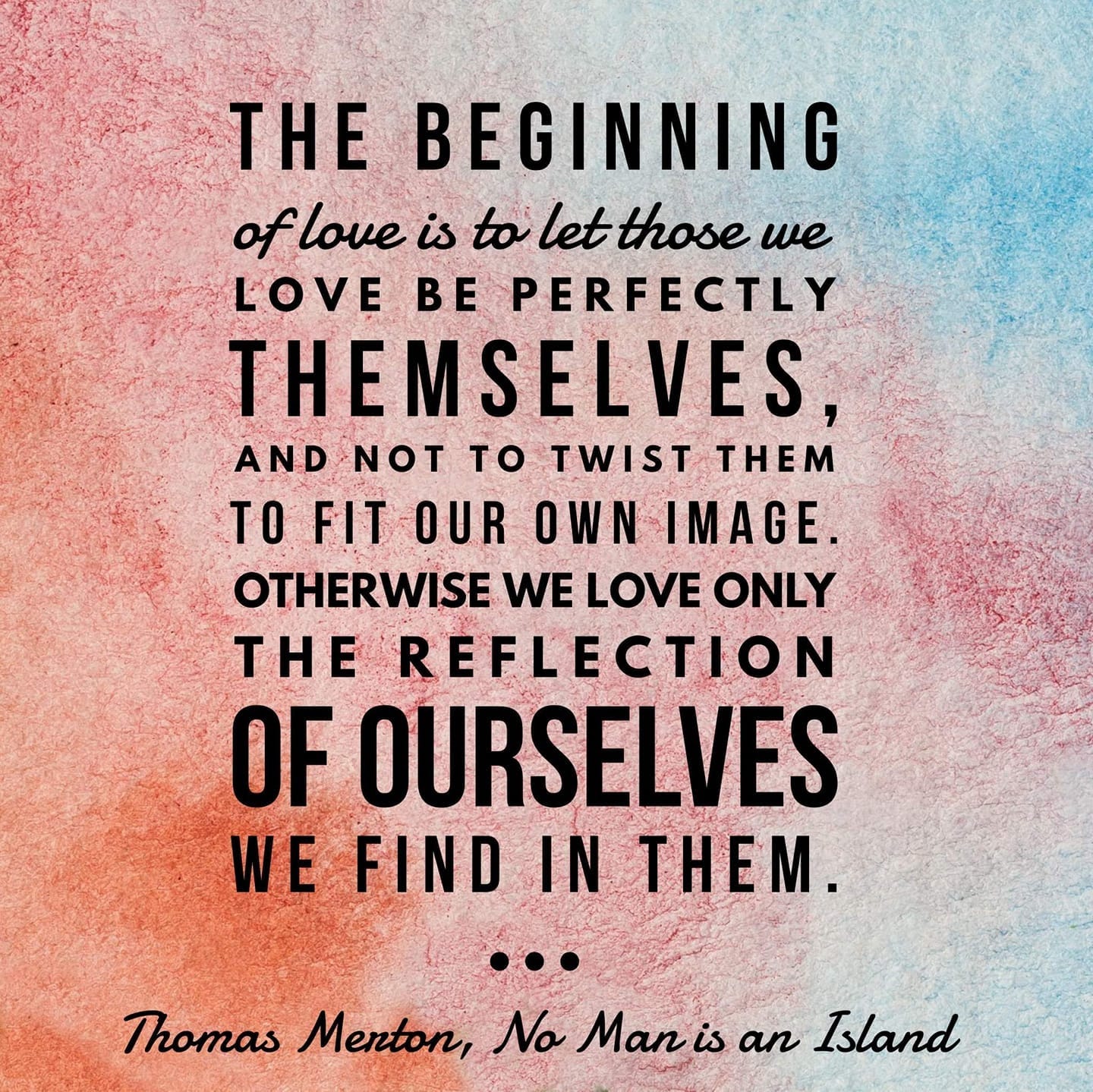Greetings from the University of New Hampshire! It’s officially fall - I have put on my slippers. I know that it’s technically officially fall at the equinox, but in my head it’s not fall until my feet can’t get warm while I’m sitting at my desk, and I have to break down and bust out the slippers. The down vest is not far behind. I pulled our window A/C units yesterday. Pretty soon I suspect we will be closing the windows until spring, and then turning on the heat. Winter is coming.
Former boss and loyal RWL reader D.R. asked me about my choice of words in last week’s RWL when I was talking about the person receiving mentorship and chose to use protégé vs. mentee. I will confess, I had not given it a great deal of thought. I mostly chose protégé for esthetic reasons - I feel like it sounds less artificial. But as soon as I read his question, the difference clicked in my head and it relates directly to what I wanted to share with you today about mentorship.
Last week I talked about the three dimensions of mentorship (job coaching, personal support, and career development). Very often mentorship is defined as a longitudinal relationship between a senior and a junior person, where the senior person provides the junior person all three dimensions of mentorship. I would generally refer to the person receiving the mentoring as the mentee in this relationship. I think proteges are a subset of mentees.
What is it that differentiates a protégé from other mentees? I think the protégé is someone who is receiving direct sponsorship from the mentor. I defined sponsorship as when “the mentor uses her/his position and reputation to give the protégé opportunities to demonstrate her/his own competence.” A protégé has to have a close organizational relationship with her/his mentor, such that the mentor can not only provide coaching and support, but can directly bring the protégé along. The longitudinal component is also important here - one does not become a protégé in a short period of time. The amount of time is subjective here, but I am thinking at least months, if not years. I think the mentor has to have a lot of reputation tied up in the success of the protégé.
A counter example of when someone is not a protégé would be from my own work as a professor. I believe I mentor many of my students each year. I provide them job coaching by teaching them basic skills (academic teaching, plus coaching on resume writing, interviewing, job searching); I provide them personal support by encouraging them to take chances, celebrating wins, and consoling them in losses; and I provide some sponsorship - I use my network to get them opportunities. I have a longitudinal relationship with all of my students that lasts at least the two years I teach them, and for some goes on for years after. But I would not say any of them are my proteges because I do not have organizational influence to help them succeed. The closest I would say I have would be some of my former students from Army-Baylor who have gone on to become professors themselves, but again, I do not have direct organizational influence to help them now, so while some of them might look at me as a mentor, I would suggest that not even these individuals are my proteges.
Words matter when we are trying to communicate complicated social phenomena. I believe protégé, when used properly, refers to a mentee who has a long-term, longitudinal relationship with their mentor, and their mentor has direct organizational influence to help advance the protégé by using their reputation and position. So a protégé is a subset of mentees who have a special relationship with their mentor that is heavily weighted toward the sponsorship portion of the career development dimension.
Thanks again to D.R. for the comment that made me clarify my thoughts on this. Next week I plan to talk about how, like light, mentorship can be thought of as both a wave and particle. I really do appreciate your comments and feedback -
Till then, enjoy the links and keep your feet warm!
Read
What: The Atlantic, David Brooks Reconsiders ‘Bobos in Paradise’
https://www.theatlantic.com/magazine/archive/2021/09/blame-the-bobos-creative-class/619492/
Why: David Brooks is the former CEO of AEI, so I find it sort of odd that he refers to himself as a bobo. I’m sort of a bobo, but I don’t identify that way, but maybe I should more than I do. I feel too purple, and I am torn between Bobo ethics and working class from my upbringing.
This article is a critique of meritocracy. I recently read The Revolt of the Elites by Christopher Lasch and he covers similar territory as Brooks. The incontrovertible fact is that all societies everywhere and always are ruled by an elite. The question both Brooks and Lasch address is the system whereby individuals move into elite status. Brooks argues here that the real source of Trumpism is a rebellion against the process whereby people become elite (a class he calls “Bobos”).
Our politics has become sharper-edged and more reactionary, in part because politics is the one arena in which the bobos cannot dominate—there aren’t enough of us.
It’s hard to summarize this article. So much ink has been spilled in elite newspapers (NYT, WaPo) claiming anyone who supports Trump is motivated by racial animus, but that is not at all what I see in my friends and colleagues who supported him. I feel like this is the best article I have read to explain Trumpism (and by extension, Wokism).
I was surprised by his embrace of Biden at the end, given he was an AEI leader, and I don’t know that I agree with him, but it was interesting to see his openness across tribes.
It’s a long piece, but it is definitely worth reading.
**
What: Thomas Merton
Why: I came across this meme on Facebook. Not sure what it’s origin is, but I think we can credit it to Thomas Merton and thank the graphic designer who made the image.
I saw this a few weeks ago and I have returned to it several times to meditate on it. I don’t usually share memes as you know, but this one struck me. There is some deep understanding here - wisdom, if you will. I’ve reflected on this statement from the lens of being an organizational leader, a teacher, a parent, and a citizen in a highly divided country. I was inspired by this quote to get the book, which I am now reading.
Watch
What: TEDx, David Autor, Will automation take away all of our jobs?
https://www.ted.com/talks/david_autor_will_automation_take_away_all_our_jobs?language=en
Why: Automation replaces routine tasks with more cognitively demanding, higher value tasks. Automation eliminates low-value jobs, but actually increases the value of the human beings who complement the automated process. It also frees up labor to work on new products and services, creating more value. I like Autor’s discussion of institutions, and his reference back to the agricultural transition in the early 20th century. Much of the problem with changes in the labor market have to do with matching, not so much displacement in my opinion.
Listen
What: HBR IdeaCast: Why Companies Need Returnship Programs
https://podcasts.apple.com/us/podcast/hbr-ideacast/id152022135?i=1000534615103
Why: A returnship program is a programmatic concept that focuses on bringing people back into the workforce after a break. The primary example is women who take a professional break for motherhood, but there are many potential examples. The returnship program is likened to an internship program, in that it comes with some structural supports to help the returner be successful. This is a really interesting idea.
Thanks for reading and see you next week! If you come across any interesting stories, won't you send them my way? I'd love to hear what you think of these suggestions, and I'd love to get suggestions from you. Feel free to drop me a line at mark.bonica@unh.edu , or you can tweet to me at @mbonica .
If you’re looking for a searchable archive, you can see my draft folder here: https://drive.google.com/drive/folders/1jwGLdjsb1WKtgH_2C-_3VvrYCtqLplFO?usp=sharing
Finally, if you find these links interesting, won’t you tell a friend?
See you next week!
Mark
Mark J. Bonica, Ph.D., MBA, MS
Associate Professor
Department of Health Management and Policy
University of New Hampshire
(603) 862-0598
mark.bonica@unh.edu
Health Leader Forge Podcast:
http://healthleaderforge.org
"Were there none discontented with what they have, the World would never reach anything better." - Florence Nightingale





